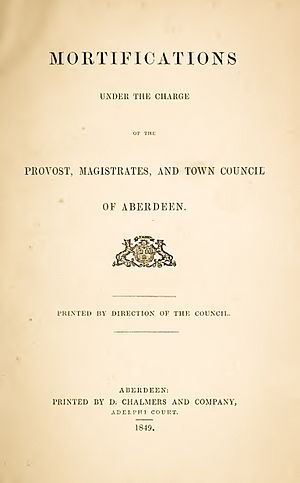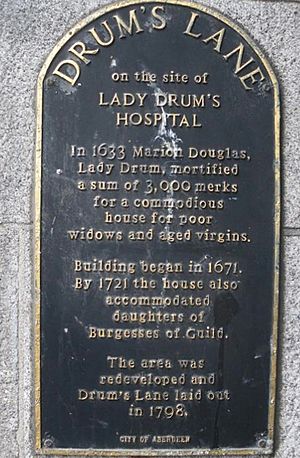Aberdeen charitable trusts facts for kids
Across the United Kingdom, many important services like hospitals and schools often rely on gifts from people or companies. These gifts are called "mortifications." Long ago, before the 1560s in Scotland, only the Church and rich noble families provided this kind of support. By the 1800s, the government and local councils started taking over this job. New laws, called Poor Laws, offered more stable help for people in need. Because of this, the use of mortifications slowly became less common.
Sometimes, a hospital, a special care home (called a Bedehouse), or a regular care home would get money directly to help them achieve their goals. The City of Aberdeen, like many other places in Scotland and the UK, still manages these charitable trusts. These trusts help its residents and were worth about £8 million in 2013. Some of these trusts are very old, dating back to the 1300s and 1400s! Generally, these mortifications were given to help members of the Guildry (a group of important citizens), the poor, and for medical, educational, cultural, arts, and heritage purposes. Recently, the City Council has reorganized these charities with the help of OSCR, which is Scotland's charity regulator. Some charities have even been closed, with their remaining money given to other similar charities in Aberdeen.
Contents
Gifts for Good Causes in Aberdeen
The city of Aberdeen has received many gifts from individuals and groups over the centuries. Some of these gifts were meant to help poor widows or members of the city's guilds and trades.
Lady Drum's Special Gift
In 1633, a kind lady named Marione Douglas, Lady Drum, gave a large sum of money. She gave 3000 Scots Merks to help "widows who had been wives of Aberdeen citizens." These women had to have lived a good life, both as wives and as widows, without any public scandal.
A special house, known as Lady Drum's Hospital, was built to provide a place for these ladies to live. In 1634, another woman, Jean Goold or Guild, also gave money. She gave 500 Merks Scots to help "poor widows and virgins." This money was worth about £26 15s 6d in 1849. Jean Guild was the widow of David Anderson, a citizen of Aberdeen. The rules for giving out this money were very strict.
The document said that the money was for "poor widows and virgins within the said burgh of Aberdeine." Widows had to be wives of Aberdeen citizens, whether merchants or craftsmen. They had to have lived a good life, free from any public scandal. Aged virgins had to be born in Aberdeen and live a life of virginity without scandal. If any woman admitted to receiving help later caused scandal, she would lose her support. The city council would decide if someone was scandalous.
Over the years, other people also added money to Lady Drum's original gift. These included Alexander Galloway in 1700, Mrs Agnes Durie, and Jean and Miss Bell Cattanach. Lady Drum's gift led to the building of the hospital in 1671. Later, in 1721, unmarried daughters of citizens were also allowed to live there. This house was torn down in 1798. Today, a plaque in Aberdeen marks the spot where Lady Drum's Hospital once stood on Upper Kirkgate.
Charities Today
Aberdeen City Council has decided to close some of these old charities. This happens when they don't have enough money to work well anymore. For example, after talking with OSCR, the money left from Lady Drum's Hospital was given to another local charity called the Instant Neighbour scheme.
What is OSCR?
OSCR stands for the Scottish Charity Regulator. It's like a watchdog for charities in Scotland. OSCR's jobs include:
- Keeping a public list of all charities.
- Helping charities follow the rules and laws.
- Making sure charities are managed properly.
OSCR believes that old charities should sometimes be combined. This helps them make the most money possible to help people. Many very old charities, especially those from before the Scottish Reformation (a big change in religion in the 1500s), have been closed recently. This is often because there are no longer people who fit the original rules to receive help. Also, the money they get from old systems like the "Feu" system has decreased. The Feu system was a way of owning land that was mostly stopped in Scotland in 2000. An example of a charity that no longer operates is Bishop Gavin Dunbar's Hospital.
See Also
- Aberdeen poorhouses
- Aberdeen trades hospitals
- Bishop Dunbar's Hospital
- Cowane's Hospital
- Hospital chantry
- Kincardine O'Neil Hospital, Aberdeenshire
- Hospitals in medieval Scotland
- Mitchell's Hospital Old Aberdeen
- Scottish Bedesmen
 | Tommie Smith |
 | Simone Manuel |
 | Shani Davis |
 | Simone Biles |
 | Alice Coachman |



